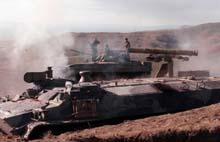 |
 |

As some military advances have been made by Russia in Chechen there has erupted lately a verbal battle by it with the US over Chechen. US President Bill Clinton rapped Russia for its "indiscriminate" military operation against Chechen civilians and its disregard for Geneva Conventions. He called for an immediate cease to Russia's military assault and efforts for a political solution to the Chechen problem through political negotiation. Yeltsin likewise lets his US counterpart not to pick holes for Russia "is fighting it out to exterminate bandits, desperate outlaws and terrorists on its own land" and that "if there remains a single terrorist in our territory we will not refrain from using our force". This shows that the newly seemingly improved Russian-US relationship is no longer what it has been. Chechen is one among the 21 autonomous union states of Russia. For years splittist activities have been carried out by Chechen authorities against Russia. In recent years, the splittist forces have even publicly declared its separation from Russia, to the point of setting up an "Islamic republic" instead. To exert pressure on the central government, the local authorities stop at nothing in instigating and helping extremists to stir up trouble and go in for various terrorist activities in an attempt to undermine the morale of people in order to break away from Russia. Russia sends its troops into Chechen this time has been designed to "root out the enclave of terrorism and the source of violence" by a crackdown on Chechen terrorists so as to finally put national splittism in check and protect national unity and territory integrity. Being a sovereign state, Russia moves forces on its own territory to crack down on terrorism and splittism is a matter of certainty that leaves no double. It is natural for Russia to give a flat refusal to all US whimsical nagging. But as things have been made known to people, behind the verbal battle of Russia and the US over Chechen there are already various geo-strategic considerations over Central Asia and Caucasus. US National Security Adviser Sandy Berger lets the cat out, "Caucasus and Central Asia are areas the US is closely concerned with". Penetration and expansion in Caucasus and Central Asia from without form an important link to the trans-century strategy of the US. In recent years, US penetration in the area has caused great dissatisfaction to Russia. Yeltsin and other Russian leaders have for many times stated the view that Caucasus and Central Asia form the strategic barrier of Russia for it is "of special strategic importance to Russia and things should develop to correspond with the security interests of Russia". It is out of this consideration that the Russian leaders have decided to stand up to US pressure and tries its best to stabilize Chechen to protect its strategic interests in Caucasus. As a matter of fact, the Russian-US verbal battle is merely an instance among the many contradictions arising between the two powers. Since this year began, the two have been engaged in an endless wrangle over NATO's eastward expansion, the Kosovo war, making amendments to "Anti-Ballistic Missile Treaty" and "Comprehensive Nuclear Test Ban Treaty". Since the end of the Cold War, US hegemonism has become so much bloated that it tries in an attempt to further enfeeble and put Russia in check so as to establish a mono-polar world headed by it. For its part, Russia is in the hopes that a multi-polar world is to be established and that it becomes an important pole. Presently, Russia is being handicapped by a tight economy, in a position with a comprehensive economic strength in no way to match with that of the US. However, it will not reconcile itself to this or submit with a bent head before the US. This is especially so when it comes to matters with regard to its sovereignty and national pride. This is to say it will not easily give in. Without doubt, it takes time for Russia to have "fair play" with the US. (By Liu Zhihai) |
Please visit People's Daily Online --- http://www.peopledaily.com.cn/english/